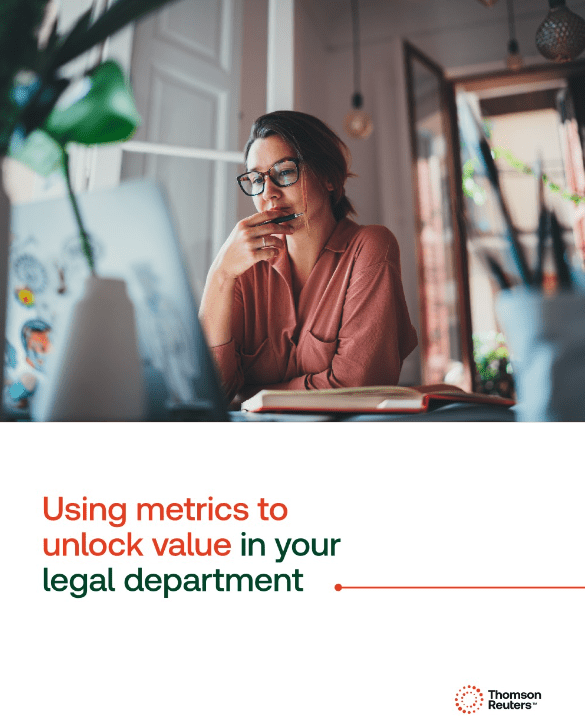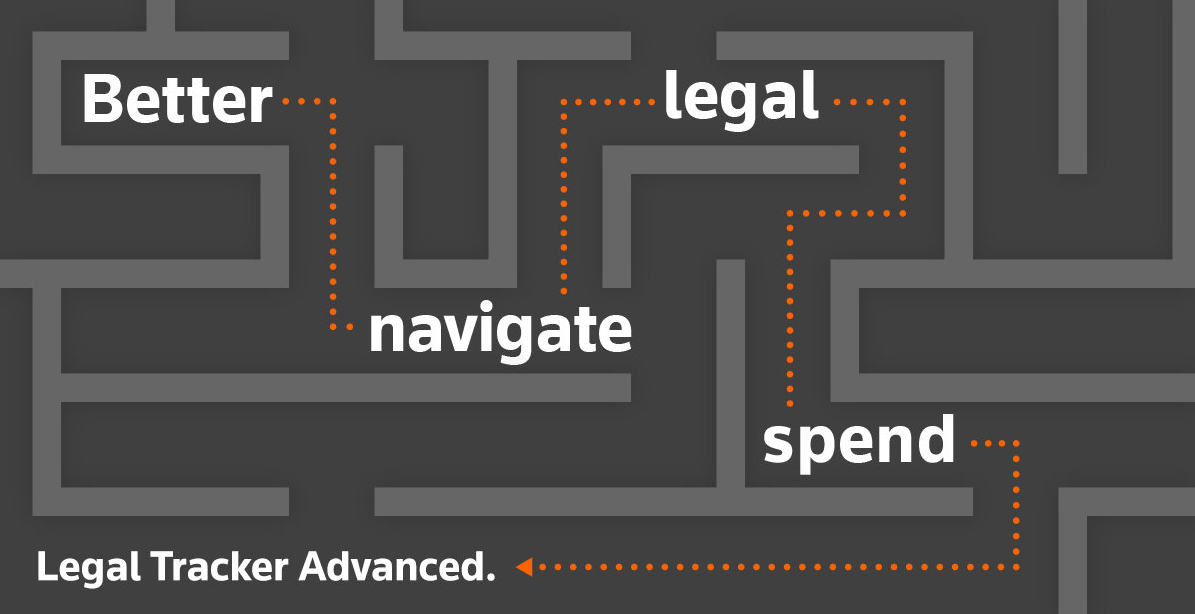Small but growing legal departments often struggle to define exactly when it’s time to invest in technology. There can be significant time and costs associated with adopting technology, so getting new tools too soon can waste these precious resources.
However, waiting until problems have grown out of control can be infinitely more costly. Below are some key signs that it’s time to invest in technology like workflow systems and artificial intelligence (AI). Modern systems enable in-house lawyers to serve their business better, become more efficient, and save money. If these feel familiar, consider creating a legal technology roadmap for your business, solving the biggest problems first.
 |
1. Your invoice review and approval process is chaotic
If you’re prioritizing invoice payment based on which law firm is calling the most, it’s probably time to get an e-billing system to help review, approve, and send the invoices to your accounts payable department.
Not only do e-billing and spend management systems keep your AP processes running smoothly, they also help you review invoices for compliance. You can flag and enforce your billing guidelines automatically, something that will help control costs and that tends to get missed when the invoices really start coming in.
2. You’re struggling with getting accruals to the finance department
If your finance department is requiring month-end accruals, getting the accruals from your law firms and tracking the accruals numbers can become burdensome as the list of law firms your legal department works with grows.
If you find yourself spending more and more time calling your law firms asking for accrual numbers and your tracking mechanism is becoming unwieldy, it may be time to get a matter management and e-billing system. With these systems, you can automate the accrual process and get them to finance automatically.
3. You need quick answers to legal questions
Businesses often need quick legal advice on the fly from their legal department. Getting them a quick answer is often difficult to impossible if you need to contact your law firms to do the research for you.
Tools like Practical Law and AI-Assisted Research on Westlaw Precision can provide quick, comprehensive answers to nuanced legal questions. You can get up to speed quickly on a new area of law or find expert guidance on a fact pattern or legal issue without calling outside counsel.
The advancements in generative AI put significant expertise at your lawyers’ fingertips. They can use this to provide even more strategic counsel to the business and manage spend more effectively.
 |
4. You don’t know your legal spend
This is perhaps the most basic number that legal departments need to track. If you’re in a smaller company, perhaps you’ve been able to track spending on a spreadsheet. More often than not, smaller legal departments don’t track spending at all.
This may work for a time if you’re a small start-up. Once your company starts growing, though, you’ll soon be asked about how much the legal department has spent on outside counsel, how much you’ve spent on certain matter types (litigation, IP, transactional, etc.), how does that spend compare to last year, and what are you doing to control legal costs.
Once you have more than a few firms doing work for your company and your legal costs have risen past a few hundred thousand dollars, it’s time to get a system to track your invoices and spend as well as give you guidance on timekeeper rate benchmarks to help you manage your spend.
5. You spend too much time looking for contracts
“Give me all of the distributor contracts that have restrictions on assignability and transferability along with all service contracts with certain warranties and covenants. Oh, and I think there’s a contract from two years ago with a heavily negotiated section on overseas distribution, I’d like that too.”
Does that request give you shivers? Contracts are a part of every business. You may be storing yours in shared drives or document management systems, but can you search them effectively? Or would you have to run keyword searches across a rudimentary folder and open dozens of documents to fulfill this request?
All your contracts likely have expiration or renewal dates to track as well. If your contract volume has reached a point where a request like the above would entail spending an enormous amount of time and tracking expiration/renewal dates has become burdensome, it may be time to investigate contract management software.
6. You need to show your department’s value
When it comes time to cut costs, cost centers are usually the first to feel the pain. And whether you like it or not, the legal department is viewed as a cost center within your business. Cost centers need to show their value to keep cuts from coming.
For a legal department, that means showing things such as spend to budget, staff workload metrics, total legal department cost as a percentage of company revenue, invoice savings, litigation exposure, how the department is reducing claims, and how you’re controlling legal costs.
Determining legal spend by matter type and business unit can help you identify problem areas in the company that are generating a surprising amount of legal spend. You can use that data to develop a plan to reduce that spend. Executives will appreciate this strategic approach to your budget.
You can use this data to justify hiring new in-house counsel when legal spend for specific matter types reach a certain level. Systems that track matters and legal spend and that can generate these types of reports are invaluable in showing value. When you start getting “what has the legal department done for me lately” questions, or better yet, when you anticipate those questions are coming, it’s time to consider such technology.
 |
7. You don’t know all of the matters that your law firms are working on at a given time
Knowing the legal matters being worked on by your law firms is crucial to being able to manage risk and your legal portfolio. If the legal work in your department has grown to the point where you can’t produce a list of all the ongoing litigation matters for your company, or all of the active contract negotiations, or all of the transactions and litigation from the last twelve months, within twenty-four hours of a request, then it’s time to consider matter management software.
8. Your IP portfolio has grown beyond a spreadsheet
Some companies tend to be IP heavy, and documents associated with patents, trademarks, and other IP assets also tend to be voluminous. If your trademarks are registered in several countries, registration dates can become hard to track. Understanding and having quick access to your entire IP portfolio is extremely important to being able to manage these assets.
If you’re having trouble keeping up with the documentation, IP workflows, and due dates surrounding your IP portfolio, it’s time to consider getting IP management software.
9. You’re having trouble keeping track of deadlines
All dates associated with legal matters are vitally important. For example, the business needs to know when contracts are up for renewal. You need to keep track of depositions and filings due dates.
Once a legal department starts getting a certain number of legal matters, keeping track of these dates, and making sure you’re on the same page as outside counsel becomes more and more difficult.
- Matter management software shows you all your upcoming deadlines in one place and also allows you to collaborate with your outside counsel.
- Contract management software tracks the terms and renewal dates of your contracts so you can monitor and ensure compliance. These systems also analyze terms for trends and outliers so you can review for consistency or certain risk areas.
With these systems in place, you can deliver one view of each matter or contract so that all stakeholders can stay on the same page.
When you start feeling like tracking deadlines has become burdensome and you’re constantly checking in with your outside counsel or business partners to confirm you’re on the same page, it’s time to look at matter management and contract management software.
10. You’re getting surprised
Nobody likes surprises in business – whether it is the outcome of a matter, a material change in a matter, or the cost of a matter. You can reduce surprises by using e-billing and matter management software.
You can use this software to track things like maximum and minimum litigation exposure and likely outcome. With this information, the legal department can keep key stakeholders apprised of potential risks and avoid embarrassing surprises.
You can require regular status reports from law firms to make sure the legal department is aware of everything going on with the matter. And you can track costs and budgets for matters so you can address issues before they turn into cost overruns.
If you feel like you don’t know everything that’s going on in your matters and worry about unwelcome surprises (or you already have), it may be time to consider an e-billing and matter management system.
Top 10 Conclusion
As your business and legal department grow, your technology needs will expand as well. Managing projects in multiple systems, manually reviewing invoices, and relying on outside counsel for advice on all new areas of law will become unsustainable.
If these top 10 factors resonate with you, it may be time to upgrade your legal department technology. Get started with Legal Tracker Advanced from Thomson Reuters.
 |











